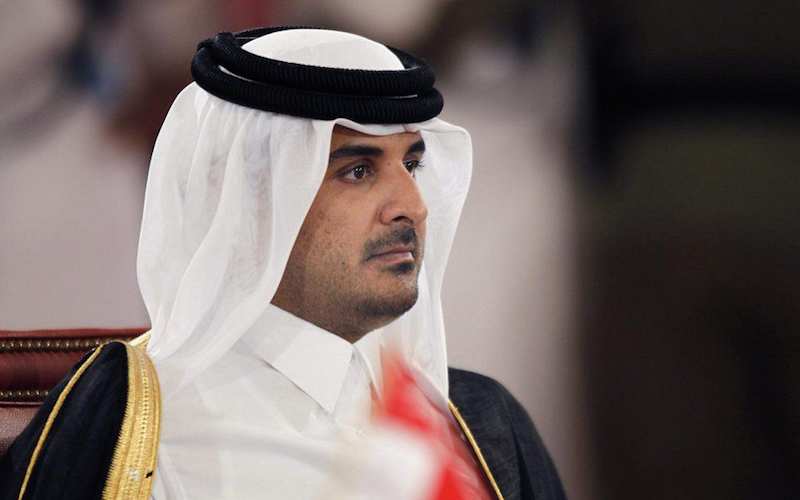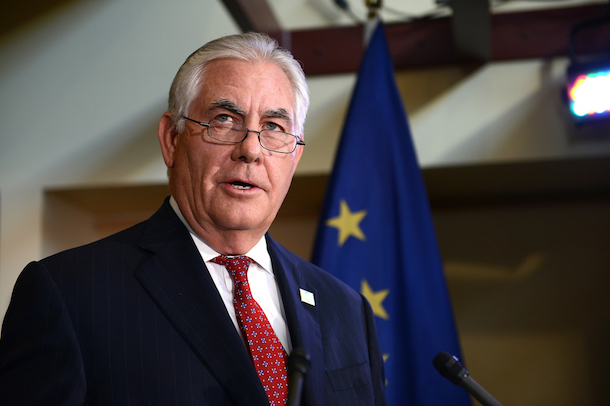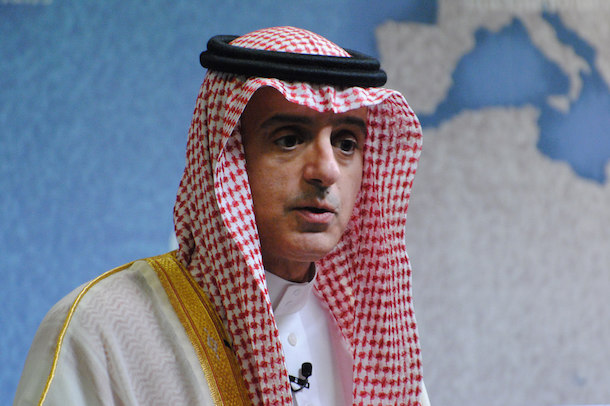
Revival of an Old Rivalry: Saudi Arabia and Qatar Clash
A full understanding of the current crisis between Saudi Arabia and Qatar is impossible without looking at the history of the tensions between these relatively new nation states.
The Qatar peninsula’s rulers have been at war with their neighbors several times, especially after the creation of Wahhabism in the Arabian Peninsula by Muhhammad ibn Abd al-Wahhab (1703-1792). The House of Saud united Arab tribes in the peninsula around a new puritanical reformist reading of Sunni Islam, and had captured large portions of the area by 1790.
The Al-Saud family made another wave of raids and even captured the holy city of Mecca in 1803, which the Ottoman Caliph did not tolerate. The Sultan sent Mohammad Ali, the mighty ruler of Egypt, to crush the revolt in the Arabian Peninsula. Although the Wahhabi forces were defeated, Wahhabism kept flourishing in the Arabian Peninsula.
These raids were not the only ones the rulers of Qatar had to deal with. Rulers of Qatar who emigrated from central Arabia into Qatar peninsula in the 1700s had already experienced incursions from Ottomans, Egyptians, southern tribes in the Arabian Peninsula, and Bahrainis. If British Army Colonel Lewis Pelly’s 1868 settlement made Qatar a semi-independent state ruled by Muhammad ibn Thani al-Thani under British protection, the Qatari rulers’ adaptation of Wahhabism in 1893 made them ideologically independent from the prevailing Ottoman ideological rule. After this ideological transformation, the complex relationship of Qatari emirs who desired to remain independent of influence by the house of Saud entered a new phase.
It is possible that the expansionist policies and raids under Abd al-Aziz ibn Saud made Al Thani rulers in Qatar more concerned with guarding themselves against the Saudis’ domination, while at the same time following their Wahhabi ideology. Perhaps it was this that led Abdullah bin Mohammed Al Thani to sign a treaty with Great Britain in 1916. In return for British military protection, Qatar surrendered its sovereignty in foreign affairs and territorial governance to Great Britain.
The British protection of Qatar showed its effects during the reign of Abd al-Aziz ibn Saud (1881-1953). He created an unprecedented form of Ikhwan (Brethren) among the Arab tribes by providing material assistance and agricultural supplies. This Wahhabi brotherhood came with the sense of a holy mission to expand its ideology to all corners of the Arabian Peninsula, carrying it on their swords. The Ikhwan captured Mecca and Medina and expelled Sharif Husayn, Britain’s favorite ruler, from Arabia in 1924. This was the real establishment of Al Saud rule over Arabia. However, Qatar, because of its security treaty with Britain, survived the Abd al-Aziz raids. This did not keep them from living in fear of their Wahhabi brothers in Riyadh who wanted Qatar as a Saudi Arabia’s province, however.
The Qatari-Saudi relationship got more complicated when Qatar achieved its independence in September 1971. A few months later, on February 22, 1972, Khalifa ibn Hamad deposed his cousin in a bloodless coup d’état, when his father was hunting with his falcons in Iran. Khalifa ibn Hamad received political, financial, and military support for his coup from the Saudis. This elevated the Saudis expectations from their Wahhabi brother in Doha, because they knew that without their help he would have not been able to capture the throne. This expectation was manifested in Saudi’s opposing Qatar’s bloodless coup in 1995 when Khalifa’s son, Hamad, took the throne from a Saudi-supported monarch.
Meanwhile Qatar started to enjoy massive oil revenue, and it created alliances with world superpowers as well as regional powers to resist Saudi hegemony, especially since Qatar and Saudi Arabia have had a long border dispute that has never been resolved although several treaties were signed in 1965, 1992, and 1996. Yet, Doha continued to cooperate with Riyadh in its local ambitions, so as not to create a hostile feeling in them. In addition, Qatar cultivated a relationship with the United States, the new power in the Persian Gulf region, and cooperated with Saudi Arabia in its campaign against Saddam Hussein in the First Persian Gulf war (1990-1991).

For the same reason, and to have leverage in their negotiations and foreign relations with the Saudis, Qatar, as the world richest nation with the highest amount of per capita GDP, had the means and motive to create and fund new competition against Saudi-funded groups in the region. Doha’s support of the Muslim Brotherhood, a movement established in 1928 and well-rooted in the Islamic world, was among these efforts. As a matter of fact, in post-2011 Syria and Iraq, especially after the establishment of ISIS rival, Jibhat al-Nusra, the historic rivalry between the nations has been transformed into a proxy war between Qatar and Saudi Arabia.
Recent accusations that Doha supports terrorism are debatable, especially since the accusations primarily come from Riyadh. Qatar has done nothing that the Saudis and their allies have not already done in Iraq and Syria when it comes to supporting jihadists. Several radical Islamic groups such as so-called “moderate rebels,” Syrian Free Army (SFA), Jibhat al-Nusra (nowadays known as the Levantine Conquest Front) all received funds and support from Riyadh.
If Qatar is supporting terrorism, so are the Saudis and their allies. But the allies themselves are very different from each other and do not have a homogeneous policy toward Saudi Arabia. Some of the allied states receive massive amounts of financial aid from the house of al-Saud, such as Egypt and Jordan, and always follow Riyadh’s foreign policy lead. Others, like Turkey and Qatar, cooperate with Riyadh in some security fields in order to keep their enemy close and not turn the Saudis against them. Some, like Bahrain, are under the full control of Saudi Arabia, while others, like UAE, are useful and close semi-independent allies.
After the recent visit by Donald Trump to Saudi Arabia, it seems that the same message that the US new administration sent to Iran, the Saudis tried to send to Qatar: “There is a new Sherriff in town.” But, practicing such power for the new American-imposed sheriff is not without difficulty in the region.
Riyadh has been suffering from a cash reserves depletion after 2014’s dramatic decline of oil prices, and has found it difficult to keep up with costly feuds, especially ones in Syria, Yemen, and Iraq. On the other hand, Doha’s ambitious plans in the region, such as spending a massive amount of cash in the Gaza strip, Iraq, Syria, Lebanon, and Afghanistan, as well as funding cultural centers and mosques in the world, are backing the Saudis into a corner while increasing Doha’s leverage. The Saudis, who think that they secured American support after Trump’s visit, are trying to end the old rivalry with Qatar. They are presenting themselves as the new sheriff and gendarme of the Persian Gulf. For Riyadh, the ideal Doha is similar to Manama and is the reason the Saudis tried to expand their Bahrainization policy to Qatar. Yet, as it has been discussed, Qatar besides its international leverage, has lots of economic weight which enables it to resist surrendering to the will of Saudi Arabia.
Qatar is currently the world’s largest liquefied natural gas (LNG) exporter and has the world’s largest liquefaction capacity: 77 million tons per annum (MTPA). According to 2016’s International Gas Union forecast for 2021 the largest LNG producer is Australia, with around 87 MTPA, and the United States, after Qatar, will be third with 61 MTPA. However, due to an estimated 46% increase in the global liquefaction capacity, there will be a demand imbalance pushing the spot prices further down. This will create a fierce competition between these countries over market share when Australia and the US LNG terminal are fully online in 2021.

Either Qatar will be pushed to the corner to make room for the US and Australia, or Washington and Canberra should own some shares in Doha’s LNG industry to profit from its LNG export. Exxon Mobile has already invested $30 Billion in the Qatar LNG complex in Ras Laffan and has a 30% interest in the assets. But any conflict may put the investments at risk. We may witness a significant US investment in the Qatar LNG industry in the near future in return for Doha’s gaining Washington’s support in its rivalry against Saudi Arabia.
Likewise, Qatar owns 70% of the US giant LNG facility Golden Pass, while Exxon and ConocoPhillips have respectively 17.6% and 12.4% shares. If such investment and support does not happen, we may expect the US and Saudi Arabia to attempt to paralyze the Qatar LNG industry in any possible way, including creating new revolts and social unrest in Doha, similar to what we saw in Syria. This option seems costly and would affect Western investments in Qatar, as well as damaging Qatar’s LNG clients’ economies.
Any disruption in LNG deliveries, especially since the US and Australia are not ready yet to replace Qatar, may adversely impact the economies of Qatar’s LNG clients in South and South East Asia, particularly, Japan, India and China. On the other hand, Beijing is the United States’ biggest trade partner, with 18% of all US foreign trade. Moreover, Qatar shares the world’s largest natural gas field, North Dome, with Iran, South Pars. Although Qatar placed a temporary short pause on its gas production from North Dome to artificially elevate the demand side of the market, it recently resumed the production. Any future disruption of gas production may only benefit Qatar’s gas producing partner, Iran, which neither the US nor Saudi Arabia and its Sunni allies want to see happen. However, these Sunni allies may not be able to come up with an effective combined plan.
The history of the Gulf Cooperation Council (GCC) since its establishment in 1981, shows how difficult it has been for the member countries to take cohesive action in various crises, such as Saddam’s war against Iran (1980-1988), the Persian Gulf War (1990-1991), and the US unilateral sanctions against Iran. Likewise the anti-terrorism Sunni alliance, formed during the Yemen crisis, even at the very beginning was a loose one. Traditional rivalries such as Turkey-Saudi Arabia, Qatar-Saudi Arabia, and Egypt-Turkey prevent members of the so-called Sunni block to take harmonious action in any situation. This has made Saudi Arabia think about a new common ground for cooperation.
The idea of an Iranian threat was Riyadh’s attempt, borrowed from Tel Aviv, to create new ground for an alliance between the Sunni states that have traditionally competed with each other for power in the Islamic world. Riyadh hoped that this alliance would lessen rivalries and slow the speed of their resource depreciation caused by these competitions for power. Moreover, the members of the alliance hoped to resolve their post-1948 issues with Israel by cooperating with Tel Aviv to fight the so-called common enemy, Iran. The reality is that, the members of this fabricated Sunni bloc cannot tolerate each other gaining more power.
When Saudi Arabia issued an ultimatum to Qatar to accept its ten conditions or face severe consequences, Turkey, an old Saudi rival, made alternative plans. President Erdogan announced his plans to send border control drones as well as 300 soldiers to Qatar. Turkey had already stationed 130 military advisors in the al-Rayyan military in Qatar to train their forces in 2016. This was to fulfill Turkey’s security pact with Qatar, which is, in fact, a strategic one because it includes Ankara’s pledge to protect Doha against any external threats. According to this agreement, Turkey is expected to send up to 5,000 military personnel to Qatar as military advisors. Erdogan moved right after the blockage to receive the Turkish Parliament’s approval to immediately send these troops.
With the current Saudi-Qatar crisis, it has become a reality that the Istanbul-Doha security pact was to protect Qatar from traditional Saudi expansionist policies, rather than Iran. After the rise of Justice and Development Party (Adalet ve Kalkinma Partisi or simply AKP), Erdogan and other leaders of the party, e.g. Ahmet Davutoglu, sent an Islamic message to the Turks as well as the Muslim nations, particularly those who used to be part of the Ottoman Empire: “We feel responsible for you.” Regardless of this slogan’s real effect in the traditional Ottoman territories, it has generated massive votes for AKP in Turkey, and will secure popular support for them.
In Erdogan’s rhetoric, Saudi Arabia has a very special place due to its traditional attempt to gain territorial and ideological independence from Istanbul since the late 1700s by attracting the support of Western powers like Great Britain. Moreover, the Saudis attempt to create an Islamic NATO may weaken Turkey’s high status in the Islamic world as NATO’s south wing member and its strategic position near Russia.
Similarly, the other member of this Saudi-created Sunni bloc, Pakistan, announced that after recent ratification by the Pakistan National Assembly, Islamabad will send 20,000 troops to Qatar. The same media outlet reported that Islamabad does not see this as a contradiction with Pakistan’s role in the Saudi-led alliance in Yemen under General Raheel Shareef’s command. General Shareef has previously expressed his dissatisfaction that Riyadh is using this anti-terrorism alliance against Iran. It appears that after Trump’s recent visit to Riyadh not everyone is happy with the new American-imposed boss in the region, particularly among GCC members.
Oman and Kuwait, as two important members of the GCC, kept a meaningful silence while the Emir of Kuwait recently embarked on a series of meddling efforts to resolve the Saudi-created crisis against Qatar. In contrast to El Sisi, the President of Egypt, and Abdullah, the King of Jordan, who cannot live without Saudi and US aid, Kuwait and Oman can, and they don’t have to follow the US-Saudi lead in this matter. Moreover, the same fears and rivalries between Qatar and Saudi Arabia exist between Kuwait and Saudi Arabia, as well as Oman and Saudi Arabia.
As much as Israel, the US, and Saudi Arabia (under US influence) have tried to distort reality and portray Middle East conflicts as a sectarian war between Shi’i Iran and the Sunnis (under the leadership of the Saudis), the truth prevails as the current conflict erupts among the so-called Sunni bloc. The Saudis’ anti-Iran narrative is very similar and in most cases the exact same copy/paste of words that Israel used against the Islamic Republic of Iran a long time ago. Not only the words but also the post-Salman Saudi actions show a complete coordination between Riyadh and Tel Aviv when it comes to dealing with Iran, in particular the policy of promoting Iranophobia in the region. This is not a sectarian war in the Middle East, but a geopolitical one to seize power, which has its roots in the Seventh Century and earlier.
The Iranophobia promoted by Tel Aviv and Washington has not worked as predicted. The longer it goes, the more Muslims will realize that Iranophobia is an obsession in Washington rather than a reality. This notion has zealous proponents among Cold War era warriors and CIA members, such as James Mattis, who have an old grudge against Iran after the Shah’s overthrow and the invasion of the US Embassy in Tehran in 1979. It is the same situation in Tel Aviv, which sees that Iran still openly supports Israel’s formidable opponent, Hezbollah, and has not surrendered to the pressures to accept Israel’s right to exist as a state. If Iran was the real issue that made the Saudis ask Qatar to cut ties with Iran, Riyadh should have started by requesting UAE, which has ten times more economic and diplomatic ties with Iran, to sever relations with Tehran. Instead, Riyadh made its one condition that Doha cut all ties with Iran.
One of the Saudis’ other conditions for Qatar was to stop its support for the Muslim Brotherhood and Hamas as its Gaza offshoot. At the same time the Saudis closed Qatar’s only land border with Saudi Arabia, and kept Doha from importing needed materials and foodstuffs. This is indeed a Wahhabi message to Qatari Muslims. As explained before, providing food and agricultural products were among the most crucial signs of Wahhabi Ikhwan. This blockage is in fact a message to Qatari Wahhabis that they are being punished and expelled from Wahhabi Ikhwan until they change their behavior.
This blockage has not had a significant impact on Qatar because Iran and Turkey had already started to send tons of perishable foodstuffs and agricultural products to Qatar. At the very beginning of the blockage, the Iran Chamber of Cooperatives sent an official letter explaining its intention to Qatari Ambassador Ali bin Hamad al-Sulaiti that agricultural unions in Iran are ready to fully supply Qatar with whatever it needs. Just recently, Iran let Qatar Airways use its airspace while sending its 6th Iran Air Boeing-747 cargo airplane to Doha, containing 90 tons of food. Iranian private small merchant ships also sailed to Qatar from Dayyer port in Bushehr’s province delivered 460 tons of food. In another effort to neutralize the Saudi blockage, Qatar Ports Management started direct service to link Doha’s Hamad Port to Oman’s Sohar port.
Qatar is able to resist Saudi Arabia’s Bahrainization attempts and stand against Riyadh’s wish to take full control of Doha’s internal and foreign policy as they did with Bahrain. A military intervention by Saudi Arabia to invade Qatar seems very unlikely. Besides Turkish troops and the possibility of 20,000 Pakistani soldiers, the US Central Command Headquarters is situated at the massive al-Udeid airbase in Qatar. It is home to 10,000 military personnel, several fighter jets and B-52s. Qatar is also financially independent (from Saudi Arabia) with good economic and diplomatic relationships with world economic giants such as the US, Germany, China, India, Russia, and, Japan. Qatar Airways is currently using Iraqi, Iranian, and Persian Gulf-Sea of Oman airspaces, avoiding the sky over Saudi Arabia. Qatar is not Yemen either, where the Saudis could impose a sea blockade to starve them to death. The current crisis may end by Qatar accepting some of the Saudi terms, and Riyadh balancing its demands from Doha. If Qatar accepts all of the Saudi ten conditions, it will be giving up the leverage that has enabled Doha to remain independent from Saudi Arabia, and may turn itself into a Saudi satellite state.

